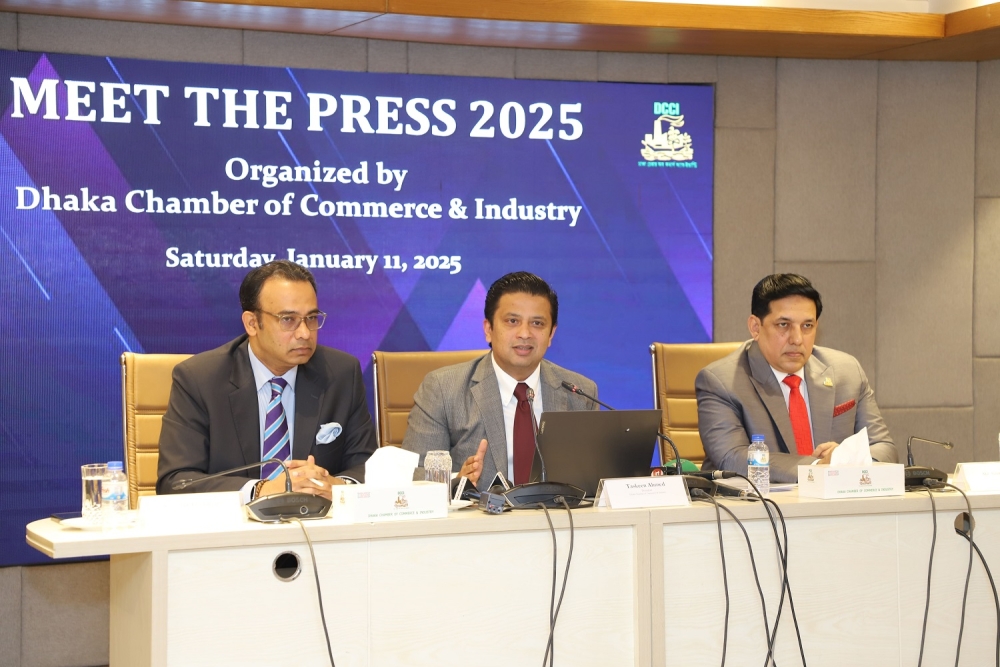News
DCCI's Meet the Press

Bangladesh is currently going through a critical moment and economic challenges, mainly due to limited foreign exchange reserves, rising import cost, high energy cost, higher inflation, high interest rates along with low access to credit. Dhaka Chamber of Commerce & Industry (DCCI) President Taskeen Ahmed at a press conference said, amidst of global geo-political turmoil and the current challenges of the international and local economies, increasing VAT on more than hundred products, increasing tax on few industries and the initiative of increasing price of gas more than twice in the industry is a catastrophic decision for our business, trade and investment as well as for the overall economy.
He told these at a press conference of DCCI held on 11 January, 2025 at DCCI auditorium. He highlighted various issues of contemporary economic situation of the country along with the priority of the Chamber for the whole year of 2025.
Taskeen Ahmed also said the country's private sector is already facing many challenges due to global geopolitical instability, its impact on the international and local economy, foreign exchange reserves, rising import cost, high energy cost, high inflation, high interest rates, high tariff rate, increasing VAT rates and above all, deteriorating law and order situation. He said this year the Dhaka Chamber will focus more on reducing interest rates, controlling inflation and keeping the foreign exchange rate stable.
Replying to a question from the reporters, he said that the flow of low-cost finance to the CMSME sector is needed to be expedited more. He cited that the CMSME sector is solely the largest sector in Bangladesh that creates the most employment generation than any other sector.
About the reform initiatives taken by the interim government, he expressed the expectation of the private sector that the government will complete the reform activities as per their set target soon. He later said that completing hundred economic zones by the year 2030 with all facilities is not an easy task. Rather, if the government is able to ensure all required infrastructure and other facilities in the five economic zones, then domestic and foreign investors will be more optimistic and there will be a possibility of expanding investment activities.
Regarding the continuation of the policy, he said entrepreneurs are encouraged to invest subject to obtaining a long-term supportive tax structure, in which case the sudden decision to increase tax or duties in the mid-way will have a negative impact on the entrepreneurs, which is not desirable at all, as a result of which local investment as well as foreign investment may be hindered, which may not bring any good for the economy, he replied to another question of a journalist.
For preparation of LDC graduation, Bangladesh was actually moving on the right direction, but due to Covid pandemic, later the Russia-Ukraine war, unrest in the Middle Eastern region, aftermath of local political unrest coupled with geo-political situation, instability in the financial market, low forex reserve, the LDC preparedness has unexpectedly got a setback. He said, how much prepared we are in the current situation will need to be determined on the basis of detailed discussions among the public, private and other stakeholders. If there is a need to defer the matter, the government may take some more time to be graduated considering the overall economy of the country based on a collective national decision. However, it should be remembered that if we graduate in 2026, government will have to ensure comprehensive cooperation to the private sector to overcome its challenges.
Later, Taskeen Ahmed said that the tax-GDP ratio in Bangladesh is very low. Moreover, the number of tax payers in the country is also not up to the expected level. To meet up the budget deficit and lessen the pressure on the economy, he suggested the government to take austerity measures in government expenditures. At the same time, he also urged the government not to take unnecessary projects and enhancing strong monitoring on implementation of ADP so that the projects end on time.
DCCI Senior Vice President Razeev H Chowdhury and Vice President Md. Salem Sulaiman and members of the board of directors were also present on the occasion.
Published on: 2025-01-11
